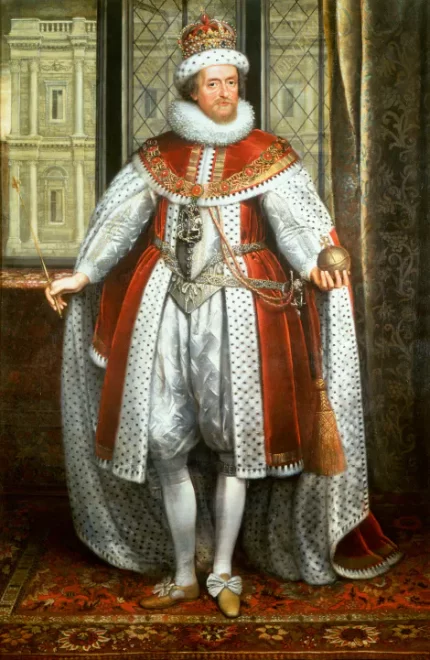The Scold’s Bridle Treatment: Lady Macbeth and Meghan Markle

Being a woman under the reign of James I (James VI of Scotland) would have been no fun. The obsession with witchcraft that had gripped Europe since the fifteenth century had been well and truly stirred up by the time it hit British shores. Accusations of witchcraft could be levelled on the flimsiest of evidence. And investigations were conducted in such a manner that evidence of guilt would assuredly be found – even if it had to be manufactured during the course of the investigative process. Both genders, of course, are capable of heresy. But research from the University of Edinburgh Survey of Scottish Witchcraft found that of the 2,500 persons executed for witchcraft, an overwhelming 84% were women.
King James himself whipped up a visceral fear of witches in his time, even publishing a book called Daemonologie. A patron of the arts, James had a large stake in Shakespeare’s theatre company, The King’s Men, and it is thought that the playwright wrote Macbeth in order to flatter his monarch and ensure his continuing support. It’s not surprising, then, that Shakespeare’s most famous tragedy does – on the face of it – play into the misogynistic mindset of his day. The most villainous characters are female: the witches, of course, and the notorious Lady Macbeth. The notion that Lady Macbeth pushed her husband into killing King Duncan in order to achieve her own ambitions is an enduring one. It is a theme that still shines through in many high school essays.
Shakespeare, though, was a clever chap. He had a way of appeasing King James with a dramatic depiction of the consequences of plotting against the monarch while subtly criticising the patriarchal injustices that prevailed. Lady Macbeth is painted as the villain of the piece, rather than a product of patriarchal forces. After much agonising, Macbeth tells her they will “proceed no further” in the plot to kill Duncan. It takes Lady Macbeth only 42 lines to change her husband’s mind. This begs the question: How strong was his resolve if it was so easily shattered? Did he, consciously or otherwise, actually want his wife to push him into the murder so that he is not solely to blame? Lady Macbeth, rather easily, achieves this reversal by challenging Macbeth’s public image as a masculine warrior: “When you durst do it, then you were a man”. She takes full advantage of a culture that equates brutal killing with masculinity. When Lady Macbeth calls upon the supernatural to ‘unsex’ her, she is acknowledging that only men had the opportunity for success open to them. She had, after all, had her traditional female role – that of mother – denied her. No alternative lifestyle existed for women, so it is perhaps understandable that Lady Macbeth sees the crown as a replacement for motherhood.
And does Macbeth have to ‘give in’ to his wife’s persuasion? Surely to do so presents him as weak. If her powers of persuasion are so strong, why does she remain nameless, hence insignificant? Her title suggests that she is simply an extension of her husband rather than a powerful character in her own right. If this is the case, how can she wield such power over her husband and drive his actions so easily? Through the character of Macbeth, Shakespeare seems to critique patriarchal society, suggesting that women are far more than silent appendages – he does, after all, have Macbeth call his wife his ’partner in greatness’. Luckily for Shakespeare, King James didn’t seem to notice …
When Bell Shakespeare’s 2023 season kicks off with Macbeth on 25 February at the Sydney Opera House, it will be interesting to see how the female characters are presented, and how performances echo or challenge current issues. The Lady Macbeth Complex has endured over the years, and comparisons are never favourable. The media – particularly the British media – has been quick to draw comparisons between Shakespeare’s most famous female and Meghan Markle. Akin to Lady Macbeth, Meghan has been described by commentators as a ‘puppet master’ who pulls Prince Harry’s strings. Ultimately, this paints the female as villain and the male as victim. The idea that a wealthy, well-connected and educated man has no capacity to direct the course of his own actions seems ludicrous in 2023, yet it is something that many are willing to buy into – fuelled by the media.
Whatever her transgressions – no one is claiming that Meghan is without fault – there is little doubt that the Duchess has been vilified. Researchers Bandwatch found that since 2021 there have been in excess of 21.000 negative news items – both tabloid and broadsheet – about her online. And in Prince Harry’s memoir, Spare, he claims that his brother William described Meghan as ‘rude’, ‘abrasive’, and ‘difficult’, suggesting that she is the source of Harry’s estrangement from his family. If this is true, then William is essentially unwittingly infantilising his brother – and, by default, absolving him of responsibility.
The hatred of Meghan reached a peak in December, when Jeremy Clarkson had a particularly unsavoury hate-fuelled rant about her published in a tabloid newspaper. Clarkson had already made it clear that he hated Meghan on a ‘cellular level’ (with no real justification as to why) but sank to new depths in this article, claiming to be ‘dreaming of the day when she is made to parade through the streets of every town in Britain’ in order that people can ‘throw lumps of excrement at her’. And Clarkson’s nonchalant response to the ensuing furore: ‘I’ve rather put my foot in it’. Even his own daughter, Emily, took to Instagram to distance herself from her father’s vitriol: ‘I want to make it very clear that I stand against everything my dad said about Meghan Markle’. But Clarkson is a serial misogynist – on his show Top Gear he once joked with a lorry driver about ‘murdered prostitutes’ and has made several similar gaffes over the years. The dehumanisation of women, and particularly Meghan Markle, has seemingly been allowed to flourish and has echoes of the witch-hunt mentality of centuries past.
Even in TV shows, the humiliation and degradation of women is on display. In one episode of Game of Thrones, the character of Cerstei Lannister is made to enact the ‘walk of shame’ at King’s Landing, in a scene that has remarkable parallels with Clarkson’s comments about Meghan. Is this Cerstei’s punishment for not conforming to society’s – in other words, men’s – gendered norms? For this seems to be a motif that runs rampant throughout history, and still has a healthy beating pulse today: the woman who refuses to be submissive must be silenced. It is shocking – or perhaps not – that the crime of being a ‘scold’ was not abolished in England and Wales until 1967. A scold is a term that is typically attributed to women, and is defined as someone who is a public nuisance due to their chastising, arguing and quarrelling (often with male authority figures). In other words, a woman who refuses to shut up and put up. The punishment for such unbecoming conduct was to be made to wear the scold’s bridle, also called a ‘witch’s bridle’, a metal contraption that enclosed the head and included a flat piece of iron that held down the tongue (yes, it responsible for the saying ‘hold your tongue’). She would be led through the streets or chained to a market cross. Bystanders would jeer, throw objects, spit, and even urinate on the woman in chains. Sometimes she would be made to wear the bridle at home as a warning to her children. The purpose was to silence, humiliate and control a woman. To break her pride. It was a popular form of punishment, favoured by those in charge of institutions such as town councils – all men.
While this barbarous device is no longer used, its spirit breathes through the unchecked behaviour of high-profile commentators like Clarkson and a media that has all the freedom of a spoilt child. But with women making up almost half of the current world population, and with numerous platforms for projection, muting is not an option. Ignoring the female voice can only end in tragedy – even a Jacobean dramatist could foresee that.





Very interesting article.
I think it’s interesting that the woman who is mixed race, fell in love and refused to be treated like a second class citizen is compared to Lady MacBeth but the woman who is white, who broke up a marriage, brought great unhappiness to the late Diana and her boys and can be said to be KC’s puppet master, Camilla, is not compared to Lady Macbeth. She’s now looked upon quite favorably.
I agree that Lady Macbeth is not a villain but a product of patriarchy as are all women.
PH has said, years BEFORE meeting Meghan, how unhappy he was being in the RF and profoundly unhappy with the British Media.
He was ALWAYS looking for an out no matter who he married.
So this irrational notion that Meghan who is half Black “lured” him away and magically changed him, whispering lurid dark notions in his ear, hypnotizing him to rail against his family, manipulating his world is the narrative some people tell themselves because their fantasy was disrupted (he did not marry fully white woman) and they believed a dishonest, lying, manipulative, racist, bigoted press.
Black women, mixed or not, do not have magical powers over anyone and it’s time people, who want to blame Meghan for a situation that was 26 years in the making, to realize that.
Harry has said publicly , “he thought his mother was hiding and then one day would take he and Willy from that place.” That doesn’t sound like someone who was planning to hang around no matter what. He was always looking for the exit but it’s interesting how people made Meghan the target.
Her crime was falling in love.